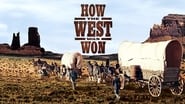Exoticalot
People are voting emotionally.
Matialth
Good concept, poorly executed.
Lightdeossk
Captivating movie !
AshUnow
This is a small, humorous movie in some ways, but it has a huge heart. What a nice experience.
grypnhmr
I saw this in the theater when I was 8 years old, with my clearest memory being how long it was. As an adult rewatching it, I can say length isn't its problem. The screenplay, script, and casting, and more are subpar. The movie, unfortunately, comes across as a deliberate vehicle for Cinerama and Debbie Reynolds, who hogs the first half of the film and is pretty unbelievable as a mid 1800s woman. A few past-their-prime actors, James Steward, Robert Preston, and Gregory Peck (the latter two looking older than their years) are the romantic interests. Likewise, George Peppard is too old to be the son of Eva Prescott. You'd think there were no young talented actors yearning for work in 1961 when the film was made.In one scene in the film, Julie Rawlings, played by Carolyn Jones (who appeared the most authentic of all the women, with the exception of Agnes Moorehead as an early pioneer woman), cries at the prospect of her husband losing his life, but in barges Debbie Reynolds with her bad imitation of an old lady, ruining one of the few emotionally genuine bits of the whole movie.Besides the big name stars---Henry Fonda, Richard Widmark, and John Wayne, to name a few of the biggest---there's some hefty historical name dropping: "Sherman..." says Sgt. Friday's sidekick to John Wayne, to which Wayne replies, "Grant...."This was an ambitious idea that ends up being squeezed into 2 hours and 45 minutes---actually less because surprisingly large segments of time are taken up with a static western scene and just music, and then there's the credits that also eat us some of that time. So, you are getting about 2 hours and 15 minutes of the supposed story of how the U.S. expanded its territory westward. It's pretty silly watching the California Gold Rush and the Civil War given such short shrift. My favorite scene was the buffalo stampede because a running herd of buffalo is awesome. I secretly wished it had gotten out of control of the animal handlers and destroyed the whole production company and put an end to this cinematic endeavor.
elvircorhodzic
HOW THE WEST WAS WON is an epic western drama about lives of several generations of an American family. A bit confusing story describes, through six episodes, their lives and their participation in important historical events, such as colonization of the West, conflicts with the Indians and the American Civil War.The scenery is quite impressive, but the final result is stingy and unimaginative. A realistic image of one part of the American history has become part of a pale fiction. It is very difficult to consolidate into a single unit these fragmented pieces. Simply, there is plenty of historical and melodramatic segments, but it is not enough for a serious picture of that time.However, this film can have a kind of motivational effect on individuals. If we ignore that epic line, some scenes are pretty exciting. The direction is solid, soundtrack is excellent and characterization is, to put it mildly, ambiguous.The large number of familiar stars in supporting roles is the greatest asset of this film. Each of them should have given a certain charm and depth to his character. It was not so bad. Of course, there is a lot of swagger, theatricality, unconvincing ambitions and limited characters.Unfortunately, a good opportunity for an excellent historical drama is missed.
grantss
Good historic-drama. Incredibly ambitious, to incorporate the entire history of the United States' exploration and development of the west through a family history. However, the movie's reach exceeds its grasp. The linkages between the generations of characters and US history sometimes seems contrived and trite. With so much ground to cover, some events are skimmed over.The whole thing just doesn't gel as well as it should. Might have something to do with the fact that each set of characters is treated as a separate story, almost entirely different from the others, and has a different director (John Ford, George Marshall, Henry Hathaway)Probably the best reason to watch is for the all-star cast: James Stewart, Gregory Peck, Henry Fonda, John Wayne (miscast as General Sherman), Debbie Reynolds, George Peppard, Richard Widmark, Karl Malden, with narration by Spencer Tracey.
SnoopyStyle
This is an fashion western of a multi-generational Prescott family encompassing every stereotype as America settles the west. The Prescott family is heading west starting from the Eerie canal. They encounter pirates and a fur trader Linus Rawlings (James Stewart). It's a good start, but the leads keep changing.Instead of following Jimmy Stewart and Carroll Baker all the way through, it switches to Debbie Reynolds and Gregory Peck as they go to California. On the way, they have an old fashion settlers and Indians shoot out. Then we switch back to Carroll Baker and George Peppard as the Civil War gets started. And it keeps going with different lead actors until the closing flyover of a Californian freeway.There is something very superficial about all of this. It's like a high school history textbook being fitted into a western movie. There are big action scenes. There are big named actors. Maybe there are too many big names. The time span is too long, and the endeavor too grand. It tries to say so much that it ends up saying very little of value.




